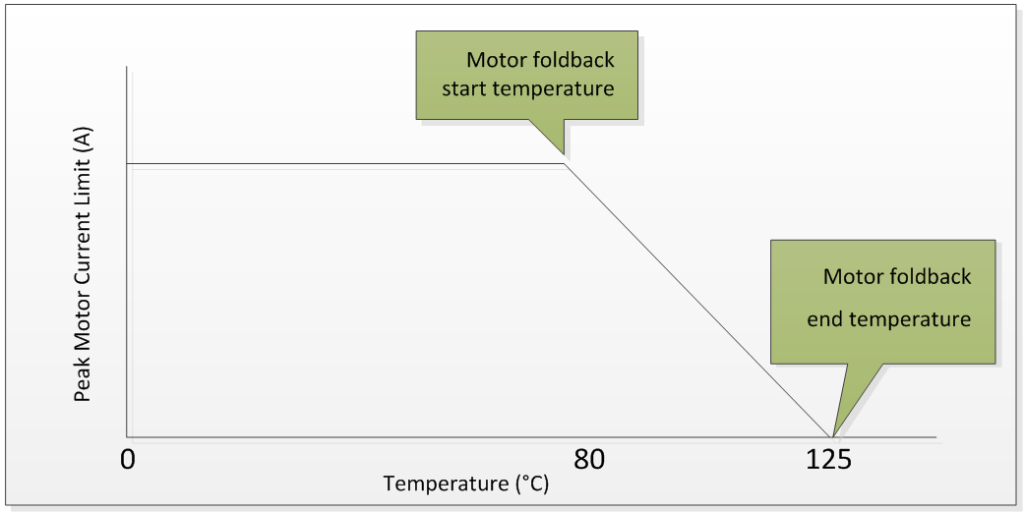Motor Foldbacks
Table of Contents
Option 1 – Motor Temperature Based Foldback
The primary benefit of using direct temperature measurements of the motor winding temperature is that it can serve to prolong a motor’s life span. It achieves this by keeping temperatures inside the housing below levels that could possibly damage internal electronics, mechanical components, and lead to possible permanent demagnetization of the magnets. For example, rare earth magnets such as neodymium can be extremely susceptible to temperature-induced demagnetization, check what temperature limits your motor manufacturer recommends.
Temperature-based foldback works using two parameters, Motor foldback starting temperature and Motor foldback end temperature. Motor foldback starting temperature is the temperature at which the controller starts folding back the peak motor current limit. Motor foldback end temperature is the temperature at which the controller has folded back the peak motor current limit to zero amps.

Option 2 – Motor I2T foldbacks
Heating setup
If your motor current is between Overload continuous current and Overload heating current, you’ll have a gain between 0 and 1. Anything above Overload heating current, the gain is 1 on the overload accumulation heating formula. This is all relative to the Overload heating time. It will take Overload heating time at or above Overload heating current to reach 100% on the overload accumulator. If you are at the midpoint between the Overload continuous current and the Overload heating current, it will take twice as long to reach 100%.
You always start at 0% on the overload accumulator after restarting the controller; keep this in mind. For example, you trigger the overload warning, restarting the controller will clear it, and you might now overheat the motor/battery.
Cooling setup
If your motor current is between Overload continuous current and Overload cooling current, you’ll have a gain between 0 and 1. Anything below the Overload cooling current, the gain is 1 on the overload accumulation cooling formula. This is all relative to the Overload cooling time. It will take Overload cooling time at or below the Overload cooling current to reach 0% on the overload accumulator. If you are at the midpoint between the Overload continuous current and the Overload cooling current, it will take twice as long to reach 0%.
Foldbacks
Overload foldback start is when you want to start reducing output motor current based on the overload accumulator value. Overload foldback end is when you want to cut all motor current output based on the overload accumulator value. Motor current output reduction is linearly interpolated between start and end foldbacks.
Configuration Parameters
Motor temperature
| Name | Description | Units | Address |
| 90 | |||
| 91 | |||
| 92 | |||
| 261 | |||
| 320 |
Motor I^2T
| Name | Description | Units | Address |
| 99 | |||
| 100 | |||
| 101 | |||
| 102 | |||
| 103 | |||
| 104 | |||
| 105 | |||
| 298 | |||
| 262 | |||
| 319 |
